Wednesday, October 31, 2007
" Brothers and sisters I bid you beware..."
The quickest way to Plerin is by the Route National, which in that particular area at that time I shirk from taking on, even when not worrying about Mol and the vet, so we all went.
The clinic was very small and modest but the atmosphere friendly. A large fluffy grey cat sat on the mat (really!), and regarded us with equanimity. It turned out he had only three paws; he was found as a stray and an accident victim, Claire, the vet, patiently fixed him up, saving one of his mangled paws but unable to rescue the other, and kept him. She was someone we immediately took to, tiny, neat grey hair, smiley, openly warm, I told her the cat looked very well. "Fat, you mean. I have three cats, they are all fat." Trembling and unhappy as she was, Molly offered to give her a kiss as she bent over her. One of the miseries of this persistent trouble, and the accompanying painful pokings and peerings into her ears, has been that she has grown a fear of the vet she didn't have before. She never liked them, of course, but was characterisitically hopeful of an upside, and fairly stoical. Now she anticipates pain and cries even before it comes.
Claire ended up calling in her colleague, and knocking Mol right out to do a thorough exploratory. We left biting our lips to kill time for an hour and a half. We sat in bar and drank two cups of hot chocolate, and the young barman was a real tonic, just a sunny and charming chap who seemed to animate the whole place. We watched a funeral (cheery! but they are a major aspect of French life, I don't remember being half so aware of funerals in the UK, perhaps because they often take place at a remove, in crematoria. Here town centres are regularly commandeered for the event), then we went and bought radishes and onions from possibly the most beautiful fruit and veg shop I've ever seen, where steel tubes around the walls intermittently puffed out dry ice to keep the produce conditioned, and you could buy little jars of different coloured sugar, including pink for barbe a papa, candy floss.
When we returned, we were greeted by a solemn but friendly moonfaced French bulldog. He followed us into the surgery. "Don't worry, he's mine," said Claire " that's Monsieur Socrates."
" It suits him." I said.
" Oh yes. He is very philosophical."
It seems to me a good sign that resident animals are so happy to hang around, dogs and cats together, in a place that smells so, well, vetty, and possibly they might exert a calming influence. However, poor Mol was beyond being calmed by them. She was coming round when we took her back, and came to howling and unreachable. In the car on my lap on the way home she quietened, but was continually straining as if to get up on her feet, while her head lolled and she shivered and twitched. Once she was home though, she seemed to become properly conscious at last, and staggered round and round in drunken circles, occasionally getting stuck in corners that she had to be extracted from like a clockwork toy. But she didn't stop wagging her tail. It seemed as though she had to check every room, every item, even her box of toys, which these days she rarely bothers with, reorienting herself and pleased to find it all still there. Tom and I knelt on the floor, initially to be down at her level, but looked at each other then clung together weeping, until Molly had to be extricated from between two dining chairs.
And that was just the preliminary. There's no alternative but to take her back to have the the entire ear canal removed. It's the more drastic but simpler and safer of two surgical alternatives, and the most effective for the problem. Her ear drum will still work. When she wants it to. She'll have to be in all day on Friday. I hate to think of her coming round like she was yesterday and our not being there, but we can't collect her until the evening. The weekend will be spent with a traumatised dog with a bucket on her head and a drain in. The drain can, it's hoped, come out on the Monday, but the bucket will be on for a couple of weeks. She have to have a lot of painkillers and antibiotics.
I can fully understand why children who have to have a lot of treatment and operations when small become spoilt tyrants and cry-babies. I can't find a cross word for her, and have to resist the urge to give her anything and anything to make up to her. It troubles and distresses me that she cannot possibly see any reason why I repeatedly take her to one place after another to people whose sole function, however nice they might come across, is to torture and frighten her, I hold her down while they do it, and she still clings to me and loves me. Animals can tolerate a low level of pain and discomfort far better than we can, as she has with the infection, without paying too much attention, because they don't have the capacity to worry about the possible implications, the future, death itself, which anxiety, with us, often makes the pain worse. On the other hand they cannot fortify themselves against the pain and shock of medical intervention, as we can, with the rational knowledge of why it's happening.
But this morning she is up and ready for breakfast, curled beside me here, looking forward to jumping on Tom to wake him up, and whatever else the day brings. Tomorrow is behind her, and she doesn't know about Friday. It's for us to torment ourselves with that. And of course for us too, there is the baleful spectre of that more than likely last visit to or from the vet, which she doesn't know about either. But that is a long way off, and not to be thought about. Cowards die a thousand deaths. She is blessed and brave, we are the cursed cowards.
Monday, October 29, 2007
Friday, October 26, 2007
The mithril coat # 1

Ilan's arrival has conjoined in the heavens with one or two happenings-upon which have prompted me to take up the knitting needles again.
Monday, October 22, 2007
Princeling
 I swore I wasn't going to do this.
I swore I wasn't going to do this.We went along to see Isobel, do the done thing, make the appropriate noises. I was prepared for what Nancy Mitford described (I seem to recall ) as 'the usual sight of a wailing orange in a fine black wig'.
Seen one you've seen them all, they all look the same... baby photos are soooo boring!
 Aren't they?
Aren't they?
I wasn't prepared to be quite so charmed by Ilan.
In fact it's a long time since I've seen one quite this small, or so delicious.
Mother and baby doing well, and quite ravishingly beautiful.
A very everyday wonder.


Sunday, October 21, 2007
Saturday, October 20, 2007
Intervention - interference?
Concerns.

I fear one of my students has deserted. My St Brieuc students are adults, often retired but sometimes between jobs, or women at an age where they're finishing bringing up their children and are looking for something to get them out, build their confidence, wake their brains up. I think this one may be one of the latter. I haven't asked her because I've felt that her confidence is so fragile, the best thing to do was leave her be, let her make friends, become one of the class, listen plenty. Too much attention and I feared she might take flight, or simply suffer agonies of self-consciousness, but I've tried to give her lots of encouraging words on the side, even the odd hug, which is rather unusual.
She stuck it all last year and it seemed to be working, she looked so much brighter and prettier when she came back and everyone greeted each other warmly. The problem is, however, that every year some people come back and some new ones arrive, and it always takes time to shake down, the students who have been coming for a while sometimes feeling held back by new arrivals. There's little scope for moving up, or dividing them into differentiated groups, it doesn't work. But this year, I decided to give them a test, based on the work covered so far, really to acknowledge the progress they'd made. Mostly they seemed to appreciate it ( I gave it as homework, not in class ), and all did well enough, the new arrivals levels were compatible with the old-timers, a few things were assessable. But my problem student seemed utterly despondent about it, and didn't show up last lesson when I returned the papers - there was of course the usual classroom twittering about 'What did you get? who did best?' ; it never ceases to amaze me how readily adults revert...
The test paper was a good idea for almost everyone, but perhaps it has undone a year's hard work for that one woman. Her paper showed that there were still large gaps in her basic knowledge of English, but I could give her special work on those, and the areas we had covered in the last year she was here she did fairly well on. I hope she's back tomorrow, and I can convey this to her, but I hate to think she feels humiliated by my intervention. I'm not always certain that the needs of the many outweigh those of the few or the one.
It's a lovely, cushy, ideal job for me, but I'm the only person doing it. I sometimes wish I had a sympathetic colleague I could discuss with.

Isobel is in hospital to have Ilan. She's basked in her pregnancy, and has reminded me of one of Renoir's rosy girls. But they decided a week or so ago that he wasn't growing enough and they would induce him a week early to 'fatten him up a bit' ( Iso's words) on the outside. So she went in at the crack of dawn on Wednesday to begin the process. But the stuff they gave her caused rapid contractions too soon, upped his heart-rate dangerously, but didn't properly start labour, so they stopped it. She's had a sleepless and worrying 48 hours of non-labour, her partner Pascal and her mum have had no option but to go home, and tomorrow they'll try again and if it doesn't work it'll be a casaerean. He's obviously quite happy in there and doesn't want to leave yet. I rang her on her bedside phone, happily another friend, who had presumably looked in expecting to see the baby, was there. Iso sounded herself but strained. She said it wasn't so bad when people from her normal life were there, otherwise it feels as if she's in an isolated hospitalised limbo.
We've come to appreciate having the wonderful French healthcare system to look after us, but in the last year or so this blind faith that all they do must be for the best has taken a couple of knocks, in that it does seem sometimes that they just can't wait to intervene, without necessarily fully weighing up the situation. But what do I know? Another friend who is a retired paediatrician seemed to think it all sounded in order, so doubtless it will all be fine eventually.

The third matter is rather more fun, but has been exercising what I am pleased to call my mind somewhat. A triangle, well, that's jumping the gun a bit, but a potential one, I shall call them A, B and C.
I had met him for the first time a week earlier - she seemed to have very purposefully kept him away from her other friends for as long as possible, also not a good sign in my reckoning. He seemed a sweet and courtly man but, oh, such an elderly spirit. In fact he is much of an age with Tom, and younger than others we know of whom I would not say the same thing. What he wants, it seems, is to turn his back on a world he wants no more of, and have someone to grow old and die with. He is, it seems to me, her antithesis. Which isn't, I know, necessarily a bar to a successful pairing, however...
Then a day or two ago when we were supposed to be standing on our heads doing yoga, she said she was going to see him again, on her way to ... (far out of her way in reality), they needed to talk. He had written reproachful and regretful letters. I pointed out everything she had told me, the irritation, the fundamental disparity in outlook etc; don't go drifting back because you feel sorry for him, I said, that is a killer. I'm fairly rubbish at giving advice borne of experience, but that I do know. But she too, I think fears loneliness; she is accustomed to being strong and independent, and it takes her by surprise when she wavers in these qualities. I didn't have too much more to offer, but did say I thought she might well find someone to whom she was better suited. She e-mailed me a bit later saying how good it had been to talk, she felt so much better and stronger. Part of me still feels gratified and aggrandised by someone saying that to me, another part slaps that part down hard and tells me I should have minded my own business and not interfered.
The other thing is, I'm damn sure she would be so much better off with C. He is a recent acquaintance whom we've very much taken to. They have so much in common, nationality, language, background, creativity... They both live very positive, independent, chosen lives, which would be enhanced by the presence of a special person who wouldn't interfere too much. Of course there might possibly be the small matter of their not being attracted to one another, but I don't think so. The funny thing is, she first introduced us to him, and on that occasion it seemed to me he was making clear overtures of friendship to her, not romance or flirtation, but a genuine interest in her interests, giving her openings. She seemed to respond, but then said rather obstinately on the way home that she wasn' t going to come across too keen, he could come to her if he wanted, she thought perhaps he was a bit too laid back, too cool in his manner,(nonsense, says Tom, he just doesn't gush, that's all...) she prefered people who were more warm and pushy... doesn't know if she wants a flag or a windmill, I reckon.
In a recent exchange with C, which was of a very flippant and bantering nature, I expressed surprise that he hadn't been 'snapped up', and he said he'd have to find someone to do the 'snapping'. As I say, it was a very jocular exchange, and not being English, I think he was simply amused by my turn of phrase. But it would indicate someone open to possibilities.
So, matchmaking, is it ever a good idea, or just a voyeuristic form of interference? I have heard tell of those who have found happiness through the meddling of others in this way. If it is a good thing, how does one go about it? It's not something I've ever felt called upon to do before, other people always seemed to have their love lives very well sorted without my intervention. I suppose it might mean I have to invite them both to dinner or something, and I was hoping to have a break from entertaining for a bit. Any advice or anecdotal evidence will be welcome in the comment thread, and in the unlikely but not impossible event that one or both of them is reading this, you know who you are, take action now!
Molly has an ear infection, another one. Antibiotics, eardrops, gooey ointments... much lamenting. When it's cleared up, do we or don't we travel huge distances at huge expense to a veterinary clinic which will perform a fairly drastic operation on her ear canal which will render her fairly hard of hearing ( and heaven knows she's selectively deaf enough...), but which should prevent this annoyingly chronic and worsening condition from recurring? Anyone with experience of cocker spaniel ear problems please leave your two cents' worth.
So there you are, the sad and trivial preoccupations of my quotidian existence. Gossip, twittering and dogs' ear secretions. Take it or leave it. Heaven is a place where nothing ever happens.
Update, Friday evening:
My student came back today, cheerful and upbeat, and seemed happy to be given some extra work to help her catch up.
Still no baby, but I spoke to Pippa, Isobel's mum on the phone. She had left them to it, Pascal, who, it was feared would be someting of a wimp in the delivery room, had come good, and last news was she was far advanced enough to have an epidural, and was, Pippa said, 'very cheerful'. High as a kite in other words. And all being well he should pop out in the wee small hours. Pippa feels that they were too hasty to intervene, but all will be well in the end.
My matchmaking plans remain very possibly a deluded fantasy.
Molly doesn't care for ear-goo but loves being on antibiotics; I melt chocolate in the microwave and wrap the pills in that.
Wednesday, October 17, 2007
Intercession in Late October
How+hard+the+year+dies,+no+frost+yet+red.jpg)
How hard the year dies; no frost yet.
On+drifts+of+yellow+sand+Midas+reclines+red.jpg)
On drifts of yellow sand Midas reclines,
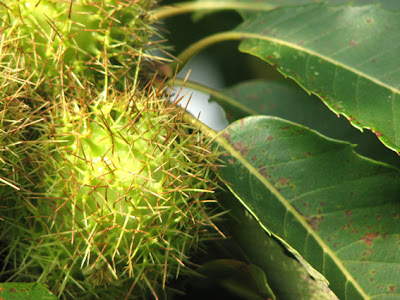+Fearless+of+moaning+reed+or+sullen+wave+red.jpg)
Fearless of moaning reed or sullen wave.
firm+and+fragrant+still+the+brambleberries+red.jpg)
Firm and fragrant still the brambleberries.
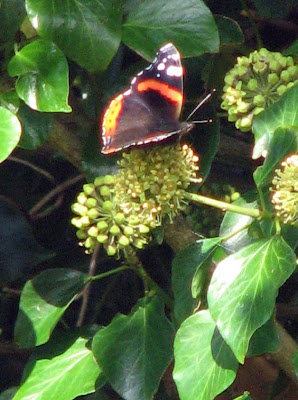On+ivy-bloom+butterflies+wag+red.jpg)
On ivy blooms butterflies wag.
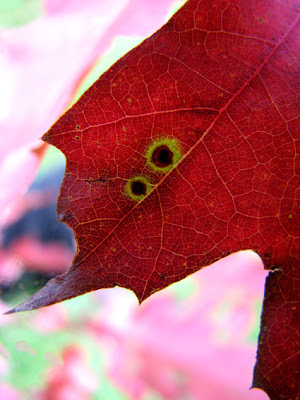+spare+him+a+little+longer,+Crone+red.jpg)
Spare him a little longer, Crone,
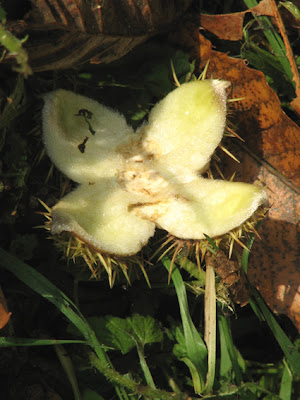+For+his+clean+hands+and+love+submissive+heart.red.jpg)
For his clean hands and love-submissive heart.
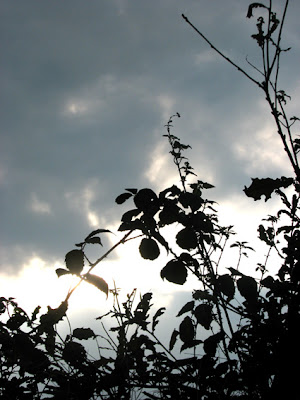end+red.jpg)
Robert Graves.
Saturday, October 13, 2007
Still life at the Château de Bogard
The fishing lake in the parkland is in use, it is a rather dreamy, reedy mere.
 I pass the long curve of railings,
I pass the long curve of railings, and pull into the wooded car park. Bogard is rich in trees, not only oaks, chestnuts and poplars, but more unusual species like aspens, a great stand of hornbeam, and a stately copper beech on the front lawn, which I love; they are much less frequent here than in Britain.
and pull into the wooded car park. Bogard is rich in trees, not only oaks, chestnuts and poplars, but more unusual species like aspens, a great stand of hornbeam, and a stately copper beech on the front lawn, which I love; they are much less frequent here than in Britain..JPG)

I don't in general do much hobnobbing with château dwelling folk. Their lives are a closed book to me. We spent one holiday before we came here to live, meandering down the Loire and its tributaries, and didn't enter a single chateau, but looked at them from the outside a little and moved on. It wasn't only the high entrance fees, or the disinclination to rub shoulders with so many coach parties, but a fear of being overwhelmed and stifled by their grandeur, the prospect of lugubrious and rather hostile rooms full of gilding and curlicues, a sense of alienation, though I liked the story of how they smuggled the Resistance members across the river down the colonnades and corridors of Chenonceaux. I have visited lesser known country châteaux occasionally, and felt a sensation as I approached them across their vast empty forecourts of something akin to true agoraphobia ( I also felt it in the approach to the Australian Parliament in Canberra), of wanting to run and hide or slink to the edges of the space and approach in a roundabout way, as if the building is making me feel unwelcome, bidding me to shrink and skulk in its presence. Inside I have felt oppressed then depressed by the atmosphere, found them lifeless and uninteresting.
Whatever I may think of the landed upper classes in Britain, be they Norman blood going back to the Conquest, the scions of 19th century industrialists, or even modern millionaires, they are somehow a known quantity. Their names and titles pepper the narrative of our national life, past and present, their houses and grounds, roped and guided, the gardens delightful, the parks turned into funfairs and zoos, are a staple of the traditional British summer holiday. Though many grandiose stately piles left me cold, I enjoyed the parks and the animals, the monuments to climb, and often the impressive scale of the places, in a country where cosy often verges on pokey. And I've pleasant memories of smaller lesser known country houses; once on a rainy afternoon as a child with my parents, a very courteous welcoming old fellow gave us, the only visitors, a personal tour, invited me to play an 18th century piano, said he vaguely remembered Florence Nightingale's sister from when he was a child. He was Sir Somebody-or-other, I don't know if I was unduly impressed by this even then, but I was by his general kindness, the lack of side about him, his listening to my chatting about the falcons I'd seen on the way there ( I thought they were peregrines at the time, on reflection they were probably hobbies ); another time when I was older, I cycled down a long lane in the Somerset levels, at the end of which was a pretty hamstone country house. A couple of Americans turned up at the same time, and the inhabitants, I don't know who they were, said they were just finishing their lunch, but please have a wander round the garden and they'd show us round shortly, which they did, taking perhaps a couple of quid off us for the service. The place was very evidently their home, as well as a bit of heritage.
But here my impression is that the château people are a world apart, aloof, closed. Some of this may be my own ignorance; ultimately, however interested an observer I am, or how much I seek to inform and educate myself, however European I try to make myself and or how distanced I inevitably become from my roots, this is not my country or my culture, I don't have that inculcated understanding of how things work and have worked, the narrative of national life will always have elements lost in translation. But I don't think it is only that; French friends concur about the château dwellers; they marry their sons and daughters to one another, it's said, they insist on using the vous form even between long-married couples, sundry things are alleged about their difference from the usual, their haughtiness. (Not that this enclosed, consolidating, defensive exclusivity here is unique to them...) Probably something to do with the Revolution, most things are. Nancy Mitford said something about the key to the strength and survival of the English aristocracy being its adaptability, and how the French is less so, more rigid and closed, though I'm not certain of the reliability of her analysis any more than my own.
I enter by the back door, and climb the ellipsoid spiral staircase. The staircases here are the stuff of my uncomfortable dreams. This one slopes inward towards its well, that small tug of off-balancing gravity gives a feeling of being insidiously sucked into a vortex. In the old part of the building, a door that looks like little more than a cupboard gives onto an ancient, crumbling tight spiral stairway in a tower, without windows or handrope. As well as dreams of undiscovered rooms - quite frequent appparently - and dangerous and collapsing upper storeys, I also have them about hidden and additional secret staircases, which are very much like that.
"His word was still, Fie, foh, and fum,I smell the blood of a British man."
The final burst of Tom's birthday month celebrations - he really must stop enjoying himself soon - has been a two week painting course in the afternoons with Jos, painting still life using the techniques of the 17th century Dutch painters, only in order to complete a painting in that time you use an alkyd medium called Liquin which dries quickly rather than linseed oil. He has enjoyed it enormously.

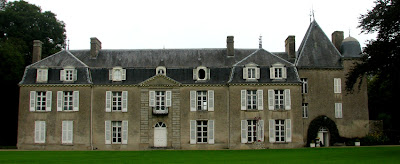 Bogard, and in the interests of information I supply a straight-on front elevation postcard-type shot of the kind I don't usually bother with, is mostly 18th century, except the right hand end with the square tower, which is 16th. It was a Breton parliamentarian family's country house, one of several fine ones of the period in the vicinity of Quessoy, whose heydey was the period leading up to the Revolution. One of the reasons the people of Brittany were such staunch counter-revolutionaries was that the centralising of the state threatened the significant and popular local power base of the Rennes parliament. Our friend Jean-Jacques says of the old Breton nobility " They were close to the people, sometimes quite poor. The houses are rather manoirs than châteaux, often they were simply farms which grew bigger." Their power was local, he told me, their attendance at the Parliament occasional.
Bogard, and in the interests of information I supply a straight-on front elevation postcard-type shot of the kind I don't usually bother with, is mostly 18th century, except the right hand end with the square tower, which is 16th. It was a Breton parliamentarian family's country house, one of several fine ones of the period in the vicinity of Quessoy, whose heydey was the period leading up to the Revolution. One of the reasons the people of Brittany were such staunch counter-revolutionaries was that the centralising of the state threatened the significant and popular local power base of the Rennes parliament. Our friend Jean-Jacques says of the old Breton nobility " They were close to the people, sometimes quite poor. The houses are rather manoirs than châteaux, often they were simply farms which grew bigger." Their power was local, he told me, their attendance at the Parliament occasional.

A 19th standard issue if deluxe model cast iron calvary cross embellishes the view of the old tower.
 But perhaps the friendliest, most interesting part of the place is the old stable block, which forms a square with the orangery. The Brothers and Jos are developing this as a venue for music and art events, wedding receptions, charity functions.
But perhaps the friendliest, most interesting part of the place is the old stable block, which forms a square with the orangery. The Brothers and Jos are developing this as a venue for music and art events, wedding receptions, charity functions.
Inside, Jos has rather spread his activities. The silvery light filters through cobwebs and climbing plants, through old glass and oval windows in thick granite walls.
 Outside, a warm corner wall shelters an abundance of pears, mixed up with other growth of this and that.
Outside, a warm corner wall shelters an abundance of pears, mixed up with other growth of this and that.

I find a motley backyard with an outbuilding behind it, the kind of place I like. Old terracotta ridge tiles, a flaking picket fence, homeless potted plants, a reclusive canna lily, old window frames and elder bushes, and oddly, a satellite dish? Out of place perhaps on the main building, tucked away here.

We went to a jolly party in the orangery last night; an Anglo-French gathering with an exhibition of paintings, including Tom's. It was remarkably well-attended. I first met Jos in April when they had a garden open day, and another exhibition of his students' work, and one of the Brothers gave a short but scholarly lecture on the garden's history and themes. As boys, they had found old plans and documents while playing in outbuildings, which had started him on his quest to learn more about it. The events are sporadic but always genial. " A cultural centre..." Jos described it as last night, "almost.". I laughed "Why almost?"
 Still life with blue coffee pot by Tom Kempton, (school of Jos Van De Ven!) - best reproduction we could get in the conditions.
Still life with blue coffee pot by Tom Kempton, (school of Jos Van De Ven!) - best reproduction we could get in the conditions.Wednesday, October 10, 2007
Sunday, October 07, 2007
Celtic Saints
 the saints, from Ireland and Wales:
the saints, from Ireland and Wales:Brioc and Suliac,Malo and Ronan,
 Ilan and Gildas, Jacut and Jaoua,
Ilan and Gildas, Jacut and Jaoua, and great St Pol de Leon, Paul Aurelian,
and great St Pol de Leon, Paul Aurelian,in currachs, in skin boats through Dorigen's cruel rocks,

into the bays and abers.
Their world was one of serpents and monsters


and donkeys turned back to front to mend their stubborn ways;
and salmon who swallowed magic tokens, or which were endlessly renewed
 and springs that sprang from them, ...
and springs that sprang from them, ...
sweet blameless children slain or maimed, (a foot of brass and silver hand one had),


Their roles and archetypes fused and were confounded
 with spirits and sorcerers, beings of sea and soil and rock,
with spirits and sorcerers, beings of sea and soil and rock, consolidated in a thousand years, or more or less,
consolidated in a thousand years, or more or less, to what was needed by the powers or the people of this time or that.
to what was needed by the powers or the people of this time or that.



***********************
( Thanks to Tom for the first photo, which he took. The material is largely from Coop Breizh's translation of O.-L. Aubert's 'Celtic Legends of Brittany'. The pictures were taken at Traon Chapel near Plouguernau, St Jaoua's Chapel in Plouvien, St Pol de Leon Cathedral, and other sites in Finistere.)


















